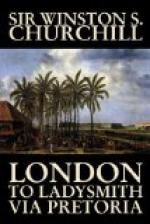The battalions, who were attacked frontally, lay down with fixed bayonets and prayed that the Boers might be encouraged by their silence to make an assault. The latter, however, were fully aware of the eagerness of the soldiers for personal collision, and kept their distance. The firing on both sides was unaimed, and very little harm was done. No one, however, had much sleep. The condition of the wounded, still lying sore and thirsty on the bare hillside, was now so shocking that Sir Redvers Buller was forced, much against his inclination, at dawn on the 25th, to send in a flag of truce to the Boer commander and ask for an armistice. This the Boers formally refused, but agreed that if we would not fire on their positions during the day they would not prevent our bearer companies from removing the wounded and burying the dead.
The arrangement worked well; the enemy were polite to our medical officers, and by noon all the wounded had been brought down and the dead buried. The neglect and exposure for forty-eight hours had much aggravated the case of the former, and the bodies of the dead, swollen, blackened, and torn by the terrible wounds of the expansive bullets, now so generally used by the enemy, were ugly things to see. The fact that no regular armistice was agreed on was an advantage, as we were not thereby debarred from making military movements. The Boers improved their entrenchments, and Sir Redvers Buller employed the day in withdrawing his train across the river. This movement, seeming to foreshadow another retreat, sorely disquieted the troops, who were only reassured by the promise of a general onslaught from the other flank at no distant time.
The strange quiet of this Sunday, the first day since the 14th of the month unbroken by musketry and cannonade, was terminated at nine o’clock at night.
The Boers had seen the waggons passing back over the bridge, and were anxious to find out whether or not the infantry were following, and if the low kopjes were evacuated. They therefore opened a tremendous magazine fire at long range on the brigades holding the line from Colenso village to the angle of the river. The fusillade was returned, and for ten minutes the musketry was louder than at any other time in this campaign. Very few casualties occurred, however, and after a while the Boers, having learned that the positions were still occupied, ceased firing, and the British soon imitated them, so that, except for the ceaseless ‘sniping,’ silence was restored.
At dawn on the 26th the artillery re-opened on both sides, and during the day a constant bombardment was maintained, in which we, having more guns, fired the greater number of shells, and the Dutch, having larger targets, hit a greater number of men. The losses were not, however, severe, except in view of the fact that they had to be endured by the infantry idly and passively.




